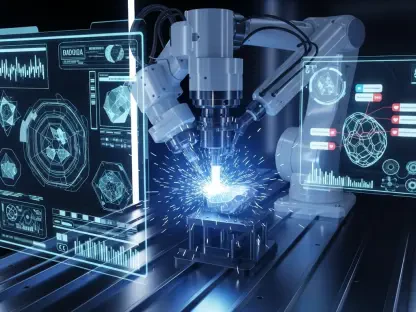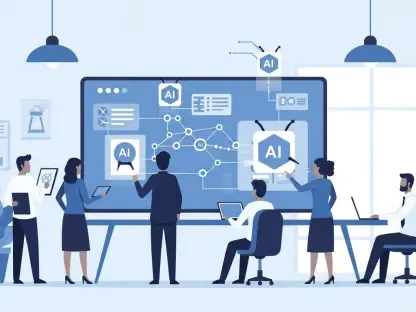In today’s rapidly advancing tech landscape, the integration of artificial intelligence into software development has shifted from a novelty to a necessity, with enterprises seeking tools that not only accelerate coding but also ensure precision and reliability in every line of code produced. Amazon Web Services (AWS) has stepped into this dynamic arena with Kiro, an innovative coding agent crafted to distinguish itself among a plethora of AI-driven solutions. Recently made widely available after an initial preview phase, Kiro introduces a transformative approach by prioritizing structured development and unwavering adherence to specifications. This focus on spec fidelity addresses a critical need in the industry, where the balance between speed and quality often tilts precariously. As developers and organizations grapple with increasingly complex projects, Kiro emerges as a potential game-changer, promising to elevate coding standards through disciplined frameworks and cutting-edge features. This exploration delves into the unique aspects of Kiro, examining how it stands out in a competitive market and reshapes enterprise coding practices.
Unveiling Kiro’s Spec-Driven Innovation
Kiro sets a new benchmark in AI coding by anchoring its functionality in spec-driven development, a methodology that ensures code aligns meticulously with predefined requirements. This approach transcends mere automation, embedding a structured process that transforms abstract ideas into robust, maintainable software. Unlike many tools that prioritize speed over substance, Kiro emphasizes behavioral accuracy through property-based testing (PBT). This technique automatically generates hundreds of test cases derived from specifications, rigorously validating code across diverse scenarios, including rare edge cases. For instance, in a retail application, PBT might simulate countless user interactions to confirm that features like inventory updates function flawlessly under varied conditions. By identifying discrepancies early, Kiro empowers developers to refine their work with confidence, ensuring that the final product adheres strictly to intended outcomes and withstands real-world challenges.
Another dimension of Kiro’s innovation lies in its ability to maintain spec fidelity over the lifecycle of a project, addressing a common pain point in AI-generated code where initial alignment often erodes over time. The tool’s checkpointing feature serves as a critical safety mechanism, allowing developers to roll back to previous states if errors emerge during iterations. This capability not only mitigates risks but also fosters a sense of security among teams tackling complex implementations. Furthermore, Kiro’s integration of multiple large language models (LLMs) ensures that tasks are matched with the most suitable model for optimal results, enhancing precision in code generation. This adaptability to varied project needs underscores AWS’s commitment to delivering a solution that prioritizes quality alongside efficiency, setting a precedent for how AI tools can support sustainable development practices in an era of relentless innovation.
Streamlining Developer Experience with Adaptive Tools
Kiro’s design reflects a deep understanding of the diverse workflows developers employ, offering tools like the Kiro CLI to seamlessly integrate into existing environments. The command-line interface builds on AWS’s prior Q Developer CLI, enabling coders to interact with the agent without disrupting their preferred setups, thus minimizing context switching. This flexibility proves invaluable for professionals who juggle multiple tools and platforms daily. Additionally, the CLI supports customization through specialized agents tailored for distinct roles, such as backend or frontend development, allowing teams to automate repetitive tasks like code formatting or log analysis. By meeting developers where they are, Kiro enhances productivity without imposing rigid structures, a factor that could significantly boost its adoption across varied organizational contexts and project scopes.
Beyond interface adaptability, Kiro addresses practical challenges in the development process with features designed to safeguard progress and encourage experimentation. The checkpointing system, for instance, acts as a fail-safe, ensuring that errors or missteps do not derail entire projects by permitting reversion to stable states. This functionality is particularly beneficial in high-stakes environments where iterative testing is routine. Meanwhile, AWS bolsters accessibility by offering incentives such as free credits for startups, lowering the barrier for smaller entities to leverage advanced AI coding capabilities. Such initiatives reflect a strategic effort to democratize access to cutting-edge technology, fostering an inclusive ecosystem where innovation isn’t confined to large enterprises. Together, these elements position Kiro as a versatile ally for developers navigating the complexities of modern software creation.
Differentiating in a Crowded Market of Coding Agents
The arena of AI coding agents brims with formidable competitors, including OpenAI’s GPT-Codex, Google’s Gemini CLI, and Anthropic’s Claude Code, each vying for dominance with accessible, feature-rich platforms. Amid this intense rivalry, Kiro carves a distinct path by honing in on structured adherence and spec fidelity, areas where others may fall short. While many solutions emphasize broad integration across IDEs and web platforms, Kiro’s focus on behavioral accuracy through spec-driven development tackles the critical issue of code reliability head-on. Its ability to route tasks to the most appropriate LLM, whether from AWS’s own suite or external options like Anthropic’s models, further amplifies its effectiveness, offering a level of customization that aligns with specific project demands and sets it apart in a market often criticized for one-size-fits-all approaches.
This strategic differentiation extends to how Kiro addresses enterprise concerns about long-term code maintainability, a challenge that plagues many AI-generated outputs. By embedding rigorous testing protocols like PBT, Kiro ensures that code not only meets immediate needs but also withstands future modifications and scaling. This forward-thinking approach contrasts with competitors who may prioritize immediate output over sustained quality. Additionally, the tool’s capacity to integrate seamlessly into varied development environments via the Kiro CLI demonstrates an acute awareness of developer diversity, a factor often overlooked by broader platforms. As enterprises weigh options in this competitive landscape, Kiro’s commitment to precision and adaptability could redefine expectations, pushing the industry toward a higher standard of AI-assisted coding that balances innovation with dependability.
Pioneering Trends in Enterprise Software Development
Kiro’s introduction aligns with overarching industry shifts toward deeper integration of AI tools into software development, driven by a pressing need for solutions that enhance both efficiency and reliability. Enterprises are no longer content with tools that merely speed up coding; they demand platforms that ensure code integrity and support tailored workflows. Kiro meets these expectations by offering model-agnostic adaptability and structured processes, reflecting a trend where flexibility and precision are paramount. Success stories from companies like Monday.com, which have reaped substantial benefits from AI-powered coding, highlight the growing appetite for such technologies, suggesting that Kiro’s focus on spec fidelity could resonate strongly with organizations aiming to future-proof their development pipelines.
Looking ahead, Kiro’s impact may extend beyond individual features to influence broader industry benchmarks, particularly in how coding agents are designed to support collaborative and creative problem-solving. The tool’s emphasis on maintaining spec fidelity through advanced testing and structured development hints at a potential shift in developer mental models, encouraging teams to approach projects with a blend of discipline and innovation. AWS’s incentives for startups further amplify Kiro’s reach, ensuring that even resource-constrained entities can tap into high-caliber AI assistance. As the demand for reliable, integrated coding solutions continues to surge, Kiro stands poised to shape enterprise expectations, potentially catalyzing a wave of advancements that prioritize quality alongside speed in the ever-evolving realm of software engineering.
Reflecting on Kiro’s Lasting Impact
As the dust settles on Kiro’s rollout, it becomes evident that AWS has crafted a tool that responds astutely to the nuanced demands of modern software development. Its dedication to spec fidelity through property-based testing and structured frameworks addresses longstanding gaps in AI coding reliability, offering a lifeline to enterprises wrestling with quality concerns. The seamless integration via Kiro CLI and thoughtful incentives for startups underscore a vision of inclusivity and adaptability that resonates across the industry. Moving forward, stakeholders could consider how Kiro’s innovations might inspire further refinements in coding agents, particularly in enhancing behavioral adherence. Exploring partnerships or integrations with other development tools could amplify its utility, ensuring that Kiro remains a cornerstone in the quest for precision-driven AI solutions in coding landscapes yet to unfold.









